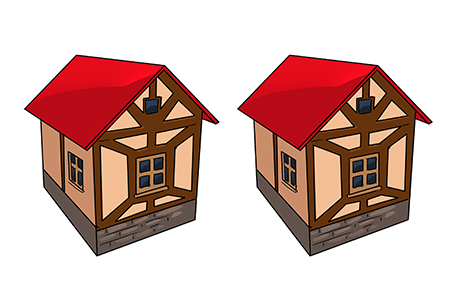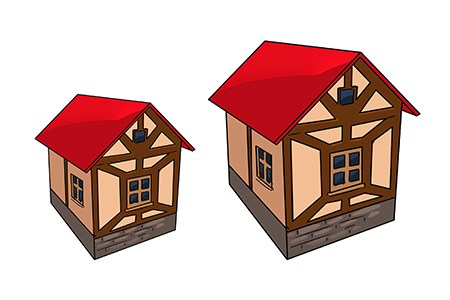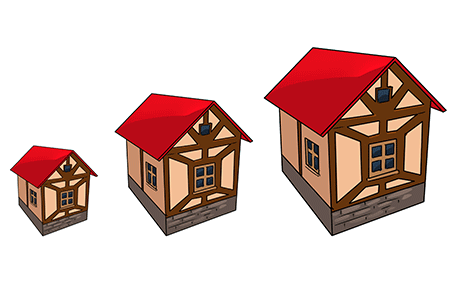Melléknevek
A melléknév emberek, állatok, tárgyak, jelenségek tulajdonságait fejezi ki.
Feloszthatjuk őket:
| Minősítőkre | Lehet őket fokozni ( |
|
|---|---|---|
| Viszonyítókra | Nem lehet őket fokozni | |
| Birtoklást kifejezőkre |
|
Melléknevek ragozása
A mellékneveket mindig az előttük álló főnév szerint ragozzuk.
ten pekný muž tá pekná žena to pekné dieťa
- Hímnemű mellékneveknél az -ý végződést használjuk.
- Nőnemű mellékneveknél az -á végződést használjuk
- Semlegesnemű mellékneveknél az -é végződsét használjuk
Aký je dom? - Dom je vysoký. Aká je ruža? - Ruža je pekná. Aké je srdce? - Srdce je červené.
Megjegyzés: A szótárak hagyományosan az I. sz., alanyesetű, hímnemű mellékneveket tartalmazzák. (napr.
A pekný és a cudzí minta
Ez a két minta nagyon hasonlít egymáshoz. A különbség abban rejlik, hogy a
| Egyes szám | ||||||
|---|---|---|---|---|---|---|
| Hím nem | Nő nem | Semleges nem | Hím nem | Nő nem | Semleges nem | |
| N | pekn-ý | pekn-á | pekn-é | cudz-í | cudz-ia | cudz-ie |
| G | pekn-ého | pekn-ej | pekn-ého | cudz-ieho | cudz-ej | cudz-ieho |
| D | pekn-ému | pekn-ej | pekn-ému | cudz-iemu | cudz-ej | cudz-iemu |
| A |
|
pekn-ú | pekn-é |
|
cudz-iu | cudz-ie |
| L | pekn-om | pekn-ej | pekn-om | cudz-om | cudz-ej | cudz-om |
| I | pekn-ým | pekn-ou | pekn-ým | cudz-ím | cudz-ou | cudz-ím |
| Többes szám | ||||||
|---|---|---|---|---|---|---|
| Hím nem (élő) | Egyéb | Hím nem (élő) | Egyéb | |||
| N | pekn-í | pekn-é | cudz-í | cudz-ie | ||
| G | pekn-ých | pekn-ých | cudz-ích | cudz-ích | ||
| D | pekn-ým | pekn-ým | cudz-ím | cudz-ím | ||
| A | pekn-ých | pekn-é | cudz-ích | cudz-ie | ||
| L | pekn-ých | pekn-ých | cudz-ích | cudz-ích | ||
| I | pekn-ými | pekn-ými | cudz-ími | cudz-ími | ||
Minta
A páví minta szerint ragozzuk az állatokhoz köthető mellékneveket. A toldalékok hosszúak maradnak, és ezekben esetekben nem érvényes a ritmikus rövidülés szabálya.
| Egyes szám | |||
|---|---|---|---|
| Hím nem | Nő nem | Semleges nem | |
| N | páv-í | pávia | páv-ie |
| G | páv-ieho | páv-ej | páv-ieho |
| D | páv-iemu | páv-ej | páv-iemu |
| A |
|
páv-iu | páv-ie |
| L | páv-om | páv-ej | páv-om |
| I | páv-ím | páv-ou | páv-ím |
| Többes szám | |||
|---|---|---|---|
| Hím nem (élő) | Egyéb | ||
| N | páv-í | páv-ie | |
| G | páv-ích | páv-ích | |
| D | páv-ím | páv-ím | |
| A | páv-ích | páv-ie | |
| L | páv-ích | páv-ích | |
| I | páv-ími | páv-ími | |
Az otcov és a matkin minta.
Az otcov és a matkin minta szerint ragozzuk a birtokos mellékneveket.
| Egyes szám | ||||||
|---|---|---|---|---|---|---|
| Hím nem | Nő nem | Semleges nem | Hím nem | Nő nem | Semleges nem | |
| N | otcov | otcov-a | otcov-o | matkin | matkin-a | matkin-o |
| G | otcov-ho | otcov-ej | otcov-ho | matkin-ho | matkin-ej | matkin-ho |
| D | otcov-mu | otcov-ej | otcov-mu | matkin-mu | matkin-ej | matkin-mu |
| A |
|
otcov-u | otcov-o |
|
matkin-u | matkin-o |
| L | otcov-om | otcov-ej | otcov-om | matkin-om | matkin-ej | matkin-om |
| I | otcov-ým | otcov-ou | otcov-ým | matkin-ým | matkin-ou | matkin-ým |
| Többes szám | ||||||
|---|---|---|---|---|---|---|
| Hím nem (élő) | Egyéb | Hím nem (élő) | Egyéb | |||
| N | otcov-i | otcov-e | matkin-i | matkin-e | ||
| G | otcov-ých | otcov-ých | matkin-ých | matkin-ých | ||
| D | otcov-ým | otcov-ým | matkin-ým | matkin-ým | ||
| A | otcov-ých | otcov-e | matkin-ých | matkin-e | ||
| L | otcov-ých | otcov-ých | matkin-ých | matkin-ých | ||
| I | otcov-ými | otcov-ými | matkin-ými | matkin-ými | ||
| Hím nem | Nő nem | |
|---|---|---|
| Egyes szám: |
||
| ON | ||
| ONA | ||
| ONO | ||
| Többes szám: |
||
| ONI | ||
| ONY | ||
Az otcov minta szerint (otec - hímnem)
A matkin minta szerint (matka - nőnem)
| A Lenka nőnemű szó - a matkin minta szerint | ||
| A kamarát hímnemű szó - az otcov minta szerint | ||
| A brat hímnemű szó - Az otcov minta szerint |
Melléknevek és határozószavak ragozása
A fokozás lehet szabályos vagy szabálytalan. Szabálytalanul csak ezt az öt melléknevet ragozzuk (valamint a belőlük képzett határozószavakat):
Minden mást szabályoson fokozunk.
Szabályos fokozás
A fokozás második fokát a ?-ší/-ejší ? végződés hozzáadásával képezzük. A harmadik fokot pedig úgy képezzük, hogy egyszerűen hozzáadjuk a második fok elejéhez a naj- képzőt.
| 1. fok |
ľahký
könnyű
|
šikovný
ügyes
|
|---|---|---|
| 2. fok |
ľahší
könnyebb
|
šikovnejší
ügyesebb
|
| 3. fok |
najľahší
legkönnyebb
|
najšikovnejší
legügyesebb
|
A határozószavakat ugyanígy képezzük, csak a második foknál a ?-šie/-ejšie ? végződéseket használjuk. A harmadik foknál ugyanúgy a naj- képzőt tesszük hozzá a második fokhoz.
| 1. fok |
ľahko
könnyen
|
šikovne
ügyesen
|
|---|---|---|
| 2. fok |
ľahšie
könnyebben
|
šikovnejšie
ügyesebben
|
| 3. fok |
najľahšie
legkönnyebben
|
najšikovnejšie
legügyesebben
|
Szabálytalan fokozás
| 1. fok | 2. fok | 3. fok |
|---|---|---|
|
dobrý
/
dobre
jó / jól
|
lepší
/
lepšie
jobb / jobban
|
najlepší
/
najlepšie
legjobb / legjobban
|
|
zlý
/
zle
rossz / rosszul
|
horší
/
horšie
rosszabb / rosszabbul
|
najhorší
/
najhoršie
legrosszabb / legrosszabbul
|
|
malý
/
málo
kicsi / kevés
|
menší
/
menej
kisebb / kevesebb
|
najmenší
/
najmenej
legkisebb / legkevesebb
|
|
veľký
/
veľa
nagy / sok
|
väčší
/
viac
nagyobb / több
|
najväčší
/
najviac
legnagyobb / legtöbb
|
|
pekný
/
pekne
szép / szépen
|
krajší
/
krajšie
szebb / szebben
|
najkrajší
/
najkrajšie
legszebb / legszebben
|
Összehasonlítás



| 1. fok | 2. fok | 3. fok |
|---|---|---|
|